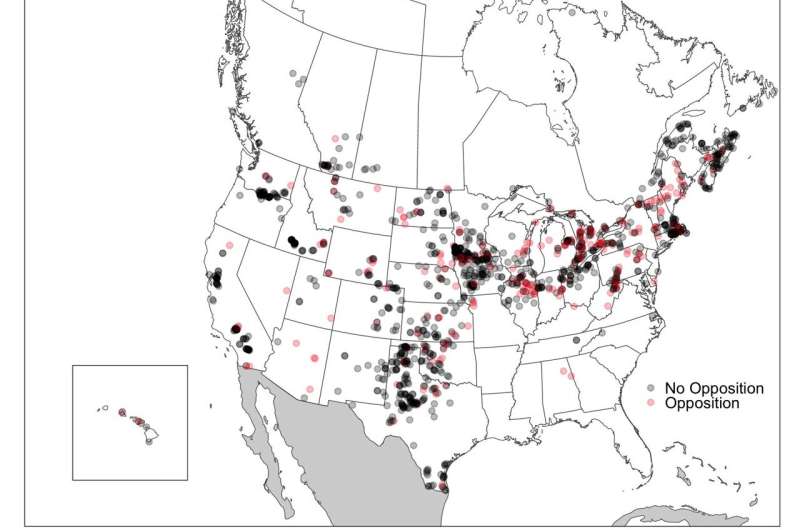This article has been reviewed according to Science X's editorial process and policies. Editors have highlighted the following attributes while ensuring the content's credibility:
fact-checked
peer-reviewed publication
trusted source
proofread
Wind energy projects in North America are more likely to be opposed by white, wealthy communities, finds study

Wind energy is, by far, the most common type of clean energy. And transitioning to clean energy is critical to addressing the climate crisis. Yet local opposition poses a significant barrier to the deployment of wind energy projects.
A study published in Proceedings of the National Academy of Sciences (PNAS) by researchers from UC Santa Barbara, the University of Michigan and Gallup Inc. examined wind energy projects throughout the United States and Canada to determine how common opposition is and what factors predict it.
The study found that nearly one in five projects faced opposition (17% of wind projects in the U.S. and 18% in Canada). It also found that opposition to wind farms involved small groups of local opponents, and was more likely in whiter communities in the United States and wealthier communities in Canada.
"Most research on opposition to wind energy projects focuses on specific case studies or small geographic areas," said Leah Stokes, lead author and the Anton Vonk Associate Professor of Environmental Politics in the Department of Political Science at UCSB. "We wanted to take a comprehensive look at political opposition across North America to understand how common opposition is and what predicts it."
The study collected over 35,000 news articles to analyze 1,415 North American wind energy projects between 2000 and 2016. Political opposition to projects was defined as physical protests, legal actions, legislation and letters to the editor. In total, 17% of wind projects in the United States and 18% in Canada faced significant opposition, with rates of opposition increasing in both countries over time.
In the U.S., opposition was concentrated in the Northeast, and in areas with a higher proportion of white residents and a lower proportion of Hispanic residents. In addition, the names of the people who opposed wind projects were overwhelmingly likely (92.4%) to be white. In Canada, opposition was concentrated in Ontario and in wealthy communities. In both countries, larger projects were more likely to face opposition than smaller projects. The number of people engaging in opposition was small at a given project: the median number of protesters was 23 in the U.S. and 34 in Canada.
"Fossil fuel plants are predominantly located in poorer communities and communities of color," Stokes explained. "These plants create pollution. We need to replace fossil fuel power plants with clean energy, like wind and solar. When wealthier, whiter communities oppose wind energy projects in their backyards, they extend the lifetime of fossil fuel projects. This is an injustice."
In the study, researchers used the term "energy privilege" to describe this environmental justice challenge: opposing clean energy is a privilege because wealthy white communities can continue to consume goods and services from burning fossil fuels while lower-income communities and communities of color bear the brunt of that pollution.
More information: Stokes, Leah C., Prevalence and predictors of wind energy opposition in North America, Proceedings of the National Academy of Sciences (2023). DOI: 10.1073/pnas.2302313120. doi.org/10.1073/pnas.2302313120
Journal information: Proceedings of the National Academy of Sciences
Provided by University of California - Santa Barbara




















